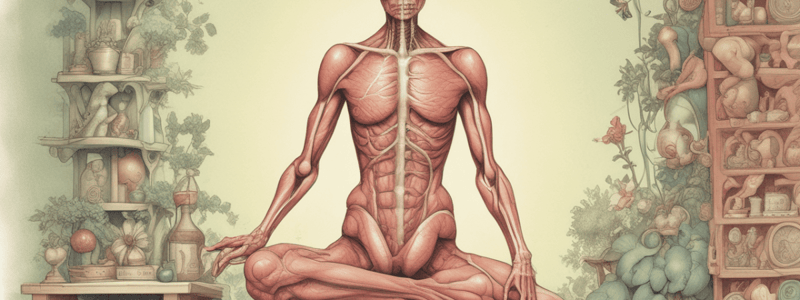Podcast
Questions and Answers
¿Cuál es la función principal del sistema nervioso?
¿Cuál es la función principal del sistema nervioso?
¿Qué sistema corporal es responsable de transportar oxígeno y nutrientes a las células?
¿Qué sistema corporal es responsable de transportar oxígeno y nutrientes a las células?
¿Cuál es la función principal del corazón en el sistema circulatorio?
¿Cuál es la función principal del corazón en el sistema circulatorio?
¿Qué sistema corporal es responsable de romper alimentos en nutrientes?
¿Qué sistema corporal es responsable de romper alimentos en nutrientes?
¿Qué sistema corporal produce hormonas que regulan diversas funciones corporales?
¿Qué sistema corporal produce hormonas que regulan diversas funciones corporales?
¿Cuál de los siguientes sistemas del cuerpo humano es responsable de regular el crecimiento y desarrollo?
¿Cuál de los siguientes sistemas del cuerpo humano es responsable de regular el crecimiento y desarrollo?
¿Cuál es la función principal del sistema integumentario?
¿Cuál es la función principal del sistema integumentario?
¿Qué sistema del cuerpo humano se encarga de eliminar el exceso de líquidos y desechos del cuerpo?
¿Qué sistema del cuerpo humano se encarga de eliminar el exceso de líquidos y desechos del cuerpo?
¿Cuál es la función principal del sistema muscular?
¿Cuál es la función principal del sistema muscular?
¿Qué sistema del cuerpo humano se encarga de producir células sexuales?
¿Qué sistema del cuerpo humano se encarga de producir células sexuales?
Flashcards are hidden until you start studying
Study Notes
Overview of Human Body Systems
The human body is composed of 11 major systems that work together to maintain homeostasis and ensure the proper functioning of the body.
1. Nervous System
- Controls and coordinates body functions
- Consists of:
- Central Nervous System (CNS): brain and spinal cord
- Peripheral Nervous System (PNS): nerves
- Functions:
- Transmits and processes information
- Regulates movement and sensation
2. Circulatory System
- Transports oxygen and nutrients to cells and removes waste products
- Consists of:
- Heart: pumps blood
- Blood vessels: arteries, veins, and capillaries
- Blood: transports oxygen and nutrients
- Functions:
- Regulates blood pressure
- Maintains body temperature
3. Respiratory System
- Brings oxygen into the body and removes carbon dioxide
- Consists of:
- Lungs: exchange oxygen and carbon dioxide
- Trachea: airway
- Bronchi: airways
- Diaphragm: muscle that aids breathing
- Functions:
- Regulates pH levels
- Maintains oxygen levels
4. Digestive System
- Breaks down food into nutrients for energy and growth
- Consists of:
- Mouth: mechanical digestion
- Esophagus: food passage
- Stomach: chemical digestion
- Small intestine: nutrient absorption
- Large intestine: water absorption and waste removal
- Functions:
- Breaks down proteins, carbohydrates, and fats
- Absorbs nutrients
5. Endocrine System
- Produces hormones that regulate various bodily functions
- Consists of:
- Glands: pancreas, thyroid, adrenal, etc.
- Functions:
- Regulates growth and development
- Maintains homeostasis
6. Immune System
- Protects the body against pathogens and diseases
- Consists of:
- White blood cells: lymphocytes and phagocytes
- Lymphatic system: filters and removes pathogens
- Functions:
- Recognizes and responds to pathogens
- Produces antibodies
7. Integumentary System
- Protects the body from external damage
- Consists of:
- Skin: barrier and regulator
- Hair: protection and insulation
- Nails: protection
- Functions:
- Regulates body temperature
- Protects against infection and injury
8. Muscular System
- Moves the body and maintains posture
- Consists of:
- Skeletal muscles: voluntary movement
- Smooth muscles: involuntary movement
- Cardiac muscles: heart function
- Functions:
- Maintains posture and balance
- Regulates movement
9. Skeletal System
- Provides support and protection for the body
- Consists of:
- Bones: framework and support
- Joints: connect bones
- Ligaments: connect bones
- Functions:
- Supports body weight
- Protects internal organs
10. Urinary System
- Removes waste and excess fluids from the body
- Consists of:
- Kidneys: filter waste and excess fluids
- Ureters: transport urine
- Bladder: stores urine
- Urethra: eliminates urine
- Functions:
- Regulates electrolyte levels
- Maintains acid-base balance
11. Reproductive System
- Produces sex cells and supports the development of a fetus
- Consists of:
- Male: testes, epididymis, vas deferens, prostate, penis
- Female: ovaries, fallopian tubes, uterus, vagina
- Functions:
- Produces sex cells
- Supports the development of a fetus
Studying That Suits You
Use AI to generate personalized quizzes and flashcards to suit your learning preferences.




